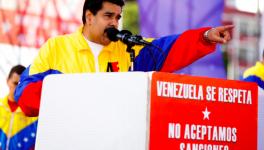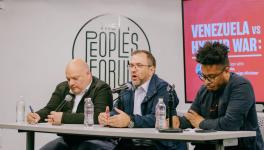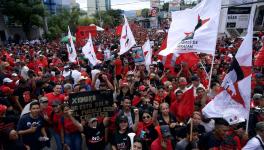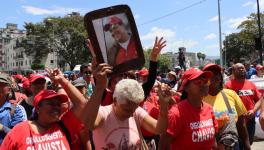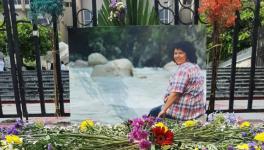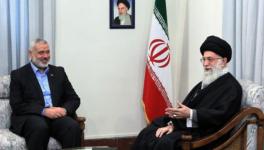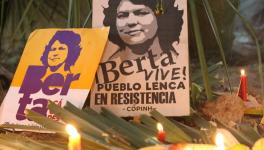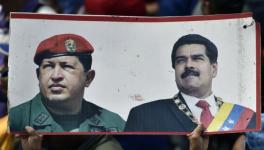“The Coup d’état was a Moment of Awakening For the Social Movements in Honduras”
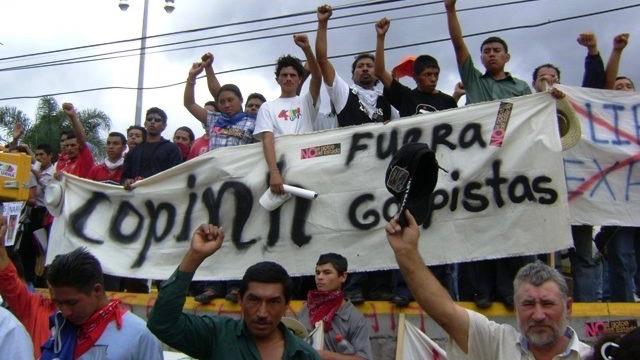
COPINH mobilizing against the coup in 2009. Photo: COPINH
June 28, 2019 was the 10 year anniversary of the coup d’état in Honduras that took overthrew constitutionally elected president Manuel Zelaya. The coup was an important moment in Honduras and Latin America as it set off a process of intense neoliberalism and repression across the region. It was also a moment of awakening for the social movements of the country and in the following years, they have undergone deep transformations.
In the final part of this three-part interview on the coup, we speak with Camilo Bermúdez, an international collaborator with the Civic Council of Popular and Indigenous Organizations of Honduras (COPINH) about the impact of the coup on Honduran social movements and the legacy of Berta Cáceres’ leadership.
Peoples Dispatch: How have the Honduran social movements transformed since the coup?
Camilo Bermúdez: After the coup d’état in 2009 in Honduras, we saw a significant restructuring of the Honduran oligarchy in line with the foreign policy of the State Department of the United States. The coup also marked a turning point for Honduran social movements.
Above all, the coup d’état was a moment of awakening for the movements. Before, there of course were movements but they had much more limited possibilities. The coup d’état was a moment of exacerbation. All the Honduran people participated in massive mobilizations on a national level. Every day, for months after the coup, people mobilized in the streets. This died down when the Cartagena agreement was signed, and it is worth mentioning that this was promoted by Hugo Chávez. But the coup moment itself saw a coalition of social organizations, and neighborhood, community-based, Indigenous, women’s, Afro-descendant, and LGBTQ groups, as well as political parties, coming together.
After the coup was legalized, a very important discussion took place in the that movement that had emerged called the National Front for Popular Resistance. This was on its political direction – whether it would continue only as a mass movement or if it would transform into a political party. Several big assemblies were held to decide this.
COPINH’s view was that the movement should continue mobilizing and advance in the process of refoundation, which is a process it had been promoting before the coup.The refoundation process, proposed by COPINH, is about going to the origin of inequality and social problems in Honduras. These did not begin with the coup but were definitely exacerbated by it. So this process was about organizing and mobilizing the grassroots and the communities and engaging in the struggle to defend their rights.
The other position was to channelize the movement into a political party with a view to gain electoral power. The idea was that by being part of the government, it could implement some cosmetic changes and bring back social welfare policies that could alleviate poverty a bit. However, these moves would not lead to transformations in the economic model, or changes in the accepting of the capitalist model and in the discrimination against important social sectors in Honduras such as Indigenous people, women and sexually diverse people.
These discussions led to the decision to convert the movement into a political party and that was how Libre (Partido Libertad y Refundación, Liberty and Refoundation Party) was founded, and it contested elections in 2013 and then in 2017.
This decision caused a significant division within the Honduran people’s movements. This has been constant since the coup, and it wasn’t by chance. There has been clear planning to infiltrate and divide the social movements along many different lines and they have been hit hard. Its leaders have been assassinated, the territories have been sold and all of the social welfare policies that at some point gave a certain stability in certain territories like in the north on the coast, have been axed. So the fragmentation has been exacerbated through the state policy to infiltrate and demobilize these processes of change at the grassroots level.
In 2015, a very strong movement against corruption emerged. After the coup, there had been a significant increase in corruption. This is not to say that it did not exist before, but it got worse with the mafia-like-control of the state. This was brought to light in 2015 with the antorchas (torches) and indignados (indignant) movement. This movement shook the country because it led to the mobilization against corruption in areas such as public health and infrastructure, which are areas where people have been able to prove clearly the embezzlement and blatant robbery that is taking place.
The people asked for a profound transformation to combat this corruption. Concretely, they asked for the formation of an instrument like the Commission Against Impunity and Corruption in Guatemala (CICIG). A product of this mobilization was the creation of a commission like this in Honduras but on a smaller scale. This mission of support (formally Mission to Support the Fight against Corruption and Impunity in Honduras) was born without the possibility of making big changes and it was successful in weakening the process of mobilization of the antorchas and indignados movement.
The elections in 2017 were another major turning point. In these elections, the ruling party committed blatant electoral fraud but what this showed is that the people wanted a change of government and a change in the political leadership. It doesn’t matter that it was someone from the center-right like Salvador Nasralla who was the true winner of the elections.
After this very open and blatant electoral fraud, a momentous mobilization took place the kinds of which had not been seen since the coup d’état. So this was another turning point and until today this momentum has not subsided and it is a sign of the refusal to conform, the indignation of the people and above all, the general crisis in the country. This is a crisis of poverty, of migration and of violence; of the lack of employment, opportunities and even investment. All this is a product of the policies of repression and corruption that characterize the state.
During this latest mobilization, it became clear that it was not only certain political or people’s organizations like COPINH, like OFRANEH that were taking part. Rather, it is the vast majority of the Honduran population that wants change. They are willing to mobilize, take to the streets and even face the risk of assassination by soldiers and the police for this.
At the same time, this surge in momentum, this social effervescence does not have clear leadership beyond the political leaders that think in terms of elections and this has impeded the possibility of a clear political strategy to take down the dictator or the regime of Juan Orlando Hernandez. So all of this momentum has not been channelized into a clear path of struggle to change things and this is one of the biggest challenges that the social and people’s movements in Honduras face; the challenge of being able to coordinate, and truly unite despite all of the differences. It is necessary to orient and guide this energy for a distinct political process in Honduras.
PD: COPINH was on the frontlines of the anti-coup protests and today, continues to be one of the most important people’s forces in Honduras and Latin America. Can you speak about the leadership of Berta Cáceres and her legacy in the mobilizations today?
CB: COPINH was one of the first organizations to mobilize when the coup d’état happened. Actually COPINH and its leaders, principally Berta Cáceres, warned that there would be a coup d’état. It was already known that these arrangements were being made and Berta Cáceres and other leaders of COPINH were able to read the situation but were ignored. Then the coup happened and COPINH was faithful to its history and principles of struggle so what the Lenca communities did was to take to the streets to mobilize.
The primordial form of struggle of the communities that are organized in COPINH is mobilization. Through public actions, they show the political presence of the Indigenous communities. This has been a line of action since it emerged to show to the rest of the population that the Indigenous people exist in Honduras. This has always been a strategy of struggle of the organization to demand rights, public policies, and a series of benefits that should be given to these communities.
After the coup, Berta Cáceres emerged as a very important leader of the social movements in Honduras. Why? Because since before the coup, she had begun to work on a process of discussion of the refounding of Honduras, going to the roots of the structural problems in the country and discussing them within the communities andwithin the peripheral sectors in order to create a different state for a different Honduras. This panoramic vision of the country began to be known during the coup.
In response to the coup, COPINH saw that it was necessary to radicalize its discussion about the refounding of Honduras and Berta was a big part of this. A characteristic of the process that Berta led was a direct confrontation with repressive forces. This involved mobilizing on the streets to confront the soldiers and police and tell them that we will not be frightened and that we are not scared of their weapons. Berta was one of the principal leaders at the forefront of the mobilizations, with the megaphone rejecting the coup. This is when the political figure of Berta began to be recognized more.
After the division in the movement, within COPINH, the focus was to go back to the communities and organize the grassroots and begin to combat the coup in the same communities.
It became clear that the government was going to sell off the territories. They planned to displace and dispossess the communities from the territories. So the response from COPINH was to confront this policy from within the territories and wage resistance. And from there to build different kinds of political processes, based on the construction of people’s power so that the communities realize that they are the ones who have the power to lead this process.
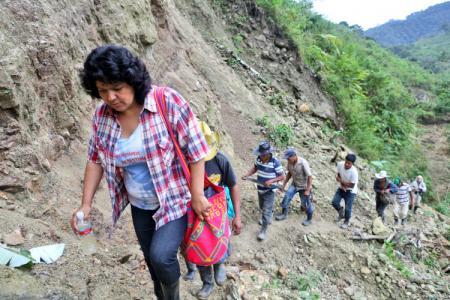
Berta Caceres in the Rio Blanco region of western Honduras where she, COPINH (the Council of Popular and Indigenous Organizations of Honduras) and the people of Rio Blanco maintained a struggle to halt construction on the Agua Zarca Hydroelectric project. Photo: Goldman prize
This very brave form of confrontation of the consequences of the coup and those who promoted the coup was what characterized the actions of Berta Cáceres and her leadership within the social movement. Within the social movements, there were and still are many people who really value her, and others who could not stand her because of her radical thought to give power to the communities and make its presence felt against the traditional politik and against repressive actors.
She really advanced in this and was in all of the important political processes that took place in the country after the coup. There was specifically a focus against privatization and dispossession in the territories. She was a leader that was always battling within the social movement for change within the same movements. She said we cannot be thinking about changing a country and if within our same organizations, we cannot change our retrograde ways of thinking.
She began to develop a thought very linked to action, of struggle against racism, patriarchy, and capitalism within the communities. This struggle against patriarchy was a very important element because even within the same COPINH and the social movements, people began to question Berta for being a woman, a woman who stood out and had very strong leadership. The way she combated this was not to stay behind, but to deepen these politics of openness and equality within the organization. For example, we have a policy of gender parity. There must be an equal number of men and women in all the positions in the organization.
These discussions took place in communities that have very strong roots in Catholicism, in a religious syncretism between the ancestral Lenca community practices and the imposed Catholicism, where women suffer from a lot of discrimination. She was able to introduce a strong discussion within the communities about the participation of women.
One of the key struggles was also in defense of the territories and against the illegal concessions that were given after the coup which Berta denounced publicly and openly. Among these was the concession for the hydroelectric project Agua Zarca, which was why she was assassinated.
The pretext was that Berta was assassinated because of her resistance to this hydroelectric project, but it was clear that it was an assassination from the state because they knew how dangerous her thought was and feared her capacity to organize. This was too much of a risk for a country where the social tension is constant. She was a very dangerous social actor for the people in power and they wanted to shut her up by assassinating her. She appeared on the lists of the death squads because she was against all of the reactionary policies that were imposed after the coup.
She was assassinated but fortunately, her organization has maintained its activity and strength. Despite thousands of obstacles that arise when an organization loses its historic leadership and its leader, it continues its resistance.
We have always said that the plan was to assassinate Berta so as to destroy her political construction which is the organization of communities that mobilize against racism, colonialism, patriarchy and capitalism. And hence, we will continue to say that Berta has not died because the mobilizations in the communities, the people and the leaders that she was able to build continue fighting against all this injustice.
This means that Berta Cáceres has not disappeared from the social movements and that contrary to what those who planned to have her killed thought, Berta Cáceres has multiplied enormously in Honduras and in the world after her death.
The massive mobilizations denouncing her assassination and demanding justice were unprecedented in Honduras and in the social movements. There is no one more recognized in the world in these moments in Europe, the US and in Latin America for their struggle in the territories, for their political struggle in Honduras than Berta Cáceres. And this has been an impact that she has had even after her death and this is a testament to the depth of her leadership.
Part one of this series: “Conservative elements wanted to stop the process of change underway in Honduras”
Part two of this series: “The US government supports the violation of human rights to protect their interests”
Get the latest reports & analysis with people's perspective on Protests, movements & deep analytical videos, discussions of the current affairs in your Telegram app. Subscribe to NewsClick's Telegram channel & get Real-Time updates on stories, as they get published on our website.










